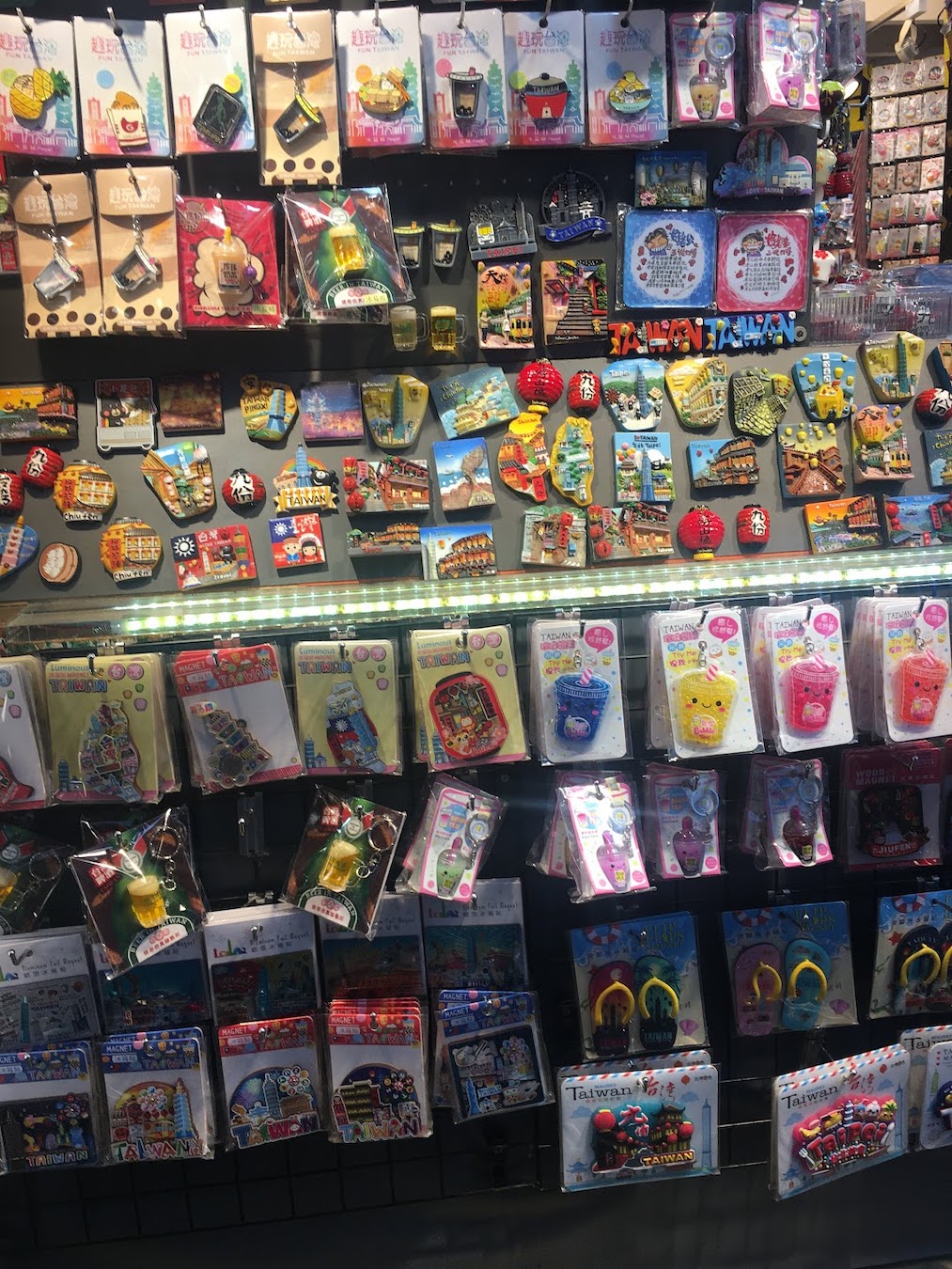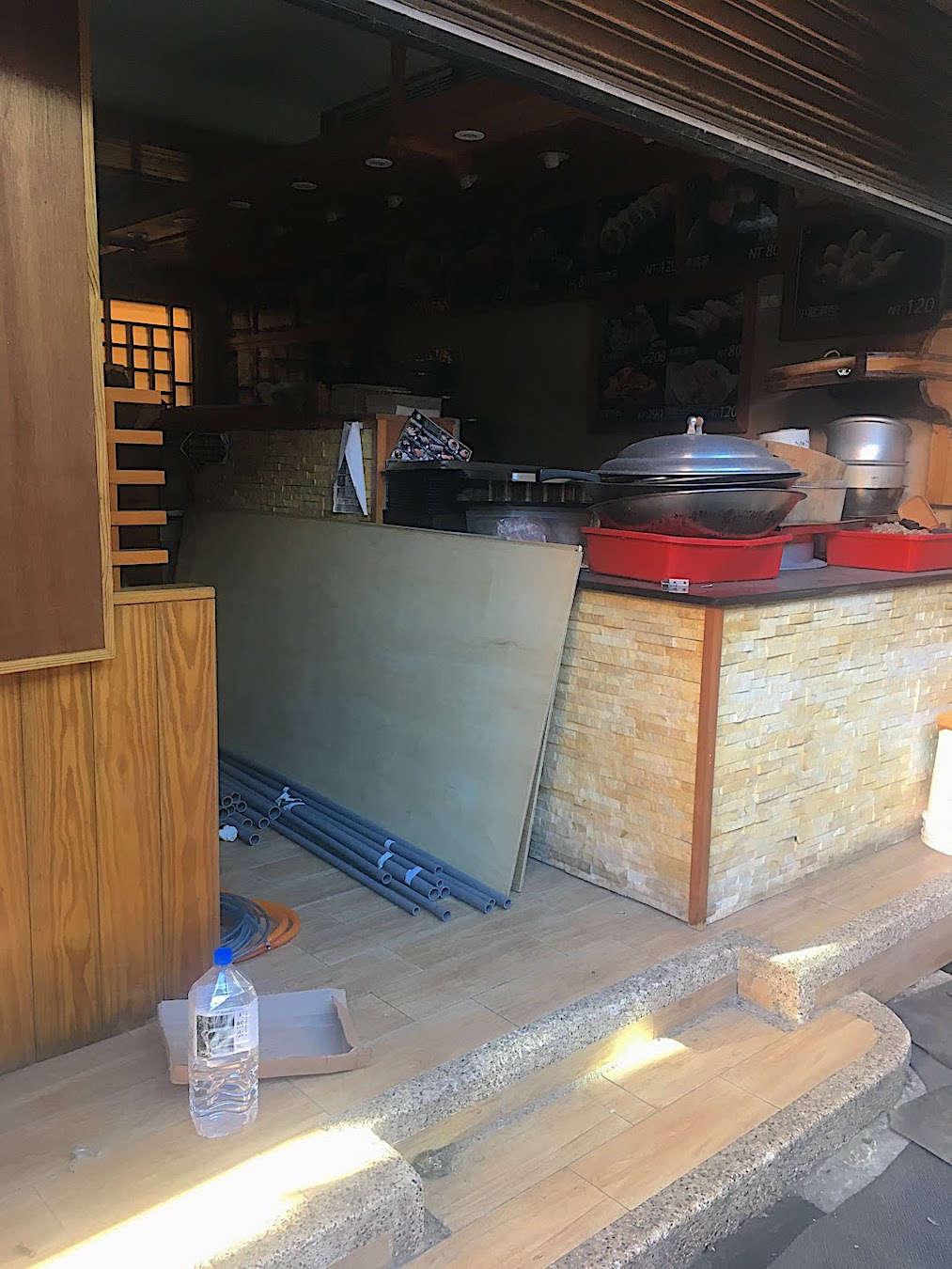by Izzy Zheng
語言:
English
Photo Credit: Mark Warburton
IF YOU’VE HEARD of Jiufen, you might know it is the site of filming for many Taiwanese movies, most notably City of Sadness. You might have heard it has wonderful teahouses, and maybe from a friend you heard to try the taro balls there. But you probably first and foremost know it as where Hayao Miyazaki allegedly drew inspiration from in Spirited Away, the hit animated movie about a girl who loses her parents in the spirit world.
And when you walk up to the entrance of Jiufen’s laojie (Old Street), it does feel a little like you’re Chihiro stumbling upon another world, a world impervious to the daily mundanities of modern life. The first step inside seals you away from the glaring sunlight with overhanging eaves of stalls after stalls after stalls. Taro balls, peanut rolled ice cream, tea, qipaos, boba, noodles, souvenirs, each stall maybe twenty feet wide before the next one starts. The street is narrow, stone-paved, and lined above with festive red lanterns. Some souvenir shop nearby is always playing the theme from Totoro, and free samples of tea and alcohol are everywhere. There are no cars here, no 7-11’s, no Watsons, no CTBC banks, just groups of people walking around eating food. And if you walk straight down the laojie or turn right down the narrow stairway, the cobblestone path deposits you at a view of the wide, rolling ocean underneath a radiant sky.

Jiufen laojie. Photo credit: Elanor Chang
Although the main draw of Jiufen for American tourists like me is this Spirited Away narrative, if you ask store owners and employees along the laojie they are largely uninterested in speaking about it. (The exception to this rule is of course Amei Teahouse’s employees, Amei Teahouse being the origin of the Spirited Away rumors. A towering multistory building beaded with red lanterns on every eave, it is said to look just like Spirited Away’s bathhouse. Amei’s boss or laoban will be happy to tell you that the tour bus operator Amei worked with before the pandemic specifically remembers bringing Hayao Miyazaki to Jiufen, and then he will give you a tour of all of the masks in the teahouse that resemble Spirited Away characters.)
Even Jiufen’s merchandise is less Spirited Away-themed than one might expect; although you’ll definitely find a fair share of No Face’s, for the most part, the souvenirs are just like those you might find in Tamsui, Shilin Night Market, or any other Taipei tourist location. There are the Taiwanese black bear tchotchkes, the Taipei 101 keychains, the Squid Game masks, the anime pencil pouches, and of course those oddly realistic plastic boba cups whose tapioca pearls swish side to side in the liquid when you tilt them to and fro. Ask the souvenir shopkeepers about who comes to Jiufen, and you’ll hear that it’s mostly Japanese and Korean tourists who are drawn to the Spirited Away narrative (Americans and other types of Western tourists are too few to mention). As much as Jiufen is the alleged inspiration for the Miyazaki film, it is just as much an extension of Taipei.
Similarly, people who live in Taiwan seem to connect Jiufen much more with Taiwanese history than with Spirited Away. For my older relatives who grew up in Taipei, the idea of Jiufen recalls a coffee ad from their childhood in the 1970s, which shows Jiufen in black-and-white footage. Since the 1970s had color film available, Jiufen must have already had an aura of history to it at the time. For Hou Hsiao-hsien (侯孝賢), the Taiwanese New Wave director, Jiufen was the perfect set for his award-winning film City of Sadness, which is set in late 1940s Taiwan in the chaos of the KMT takeover. For Yun Chen, a millennial Taiwanese civic hacker, Jiufen brings up images of older Taiwanese architecture, food, and hiking.

Amei Teahouse, street view. Photo credit: Mark Warburton
樹榣 (Shu-ku) Teahouse particularly emphasizes the older feel. Located far down the street from the bustling laojie, past where the stone path turns to paved road and snakes past various houses, Shu-ku Traditional Teahouse proudly displays mining tools used by residents in Jiufen’s gold mining days. Its speakers play a crooning Teresa Teng, musical icon of the 1970s, and when you ask the employee there about Jiufen’s main attractions, he’ll say, “I believe people like to tour old things– return to the traditional. I personally like the traditional so we do our best to decorate, to have some history.”*
This employee also expresses hope in sustaining Jiufen’s history and tradition. “I do hope that we can preserve some of this [pointing at the mining tools and decorations], because the materials will disappear…What we keep, I personally believe, has to have the mark of history.” Amei’s laoban echoes the fear of traditional places losing business, saying, “Traditional places are hit harder with the pandemic restrictions. Taiwanese people can find traditional things anywhere in Taiwan, so there’s no reason to come here [to Jiufen].”
What every single one of Jiufen’s shopkeepers will invariably be interested in telling you about is the scenery. “Have you seen it at night, with the lanterns all lit up?” they’ll ask you. “Even Tamsui is not as beautiful as Jiufen,” one taro ball shopkeeper brags. “If you stand right here around 6 PM, you’ll get the most beautiful view of the sunset,” or “Jiufen is beautiful in all four seasons, and at all times of day.”
Most of these employees in the stalls along the laojie range from growing up in Jiufen to coming all the way from Beijing, although most come from somewhere in Ruifang, the district Jiufen is located in. Walk almost to the end of the laojie and on the right is Jioufen Artist Teahouse, one of if not the oldest building in Jiufen. If you talk to the people inside, they might not remember exactly how to say Spirited Away in Mandarin, but they’ll tell you all about how the teahouse originally belonged to Wong Shanying, who was responsible for settling Jiufen. They’ll tell you how he had straw-thatched houses built for his employees’ families to settle down so that it was not so inconvenient for miners to see their families. Then around the 1970s, when the gold ran out and Jiufen went through a depression, the house became an internal medicine clinic. In fact, most of the older generation of Jiufen was born in that clinic.
More recently, Hung Chi-Sheng, a local artist-philanthropist, bought the house. He surveyed about two hundred tourists in Jiufen and asked them if they’d be interested in a teahouse; the results were positive so he established, in 1991, Jiufen’s first teahouse. Since then, many other teahouses opened up in the area and (local) tourists came in flocks to revive Jiufen’s economy – and Jiufen became known for its teahouses. At least, so says the teashop.

Photo credit: Izzy Zheng
If you return back to the laojie and stop to talk to one of the stalls selling Taiwanese tea, the employee there might want to tell you about the recent economic struggles of Jiufen’s businesses in light of the pandemic. Jiufen is dependent on tourists for its income, and with Taiwan’s pandemic entry restrictions there simply aren’t any tourists. It used to be so crowded you could barely move down the street; now, the longest you’ll stand still is five minutes waiting in line at a stall.
Lots of small stores are now closed. Other stores are open only on weekends, or when there’s business. Many of the smaller stores have let go of all of their employees, and only have the boss run the business. The main problem is the rent. Although landlords are often willing to lower rent, it’s not near enough. “Not even lowering 100,000 NTD to 50,000 NTD would be enough,” one employee said.
Other teahouse and souvenir shop workers will tell you the same story; the rent is too high, businesses have shortened their hours or have decided to open only when there are tourists, workers have been let go and forced to find work elsewhere. Estimates from store employees cluster around 50% of Jiufen Old Street businesses having closed since the pandemic, with many changing hands to new owners. Part of the issue is Jiufen’s remote location. Businesses outside of Jiufen can use Foodpanda or some other internet delivery service in light of the pandemic, shopkeepers told me. But Jiufen can’t.

Jiufen’s coastline, as seen from the laojie. Photo credit: Elanor Chang
The government isn’t much help either, according to two separate teahouse owners. There are generally funds that are meant for struggling businesses available, but they say the funds are hard to receive in practice. One told me the only businesses that got pandemic aid had government connections.
An unexpected side effect of Taiwan’s pandemic restrictions is that Jiufen is now more popular with domestic tourists. Since Spirited Away came out in 2001, Jiufen was swarmed with foreign tourists – but not so anymore. Yun Chen told me, “Before, I would not have wanted to go [to Jiufen] because there were too many tourists. Now, it’s emptier, and I’m more willing to go,” she said. “We sell a lot more Taiwanese goods now,” one souvenir shop employee said.
The restrictions also give customers time to linger. Before, said Amei’s laoban, a tourist would stay at the teahouse maximum twenty minutes before rushing off to complete the next item on the itinerary. Now, guests stay for around two hours. Another teahouse worker echoed the same sentiment, “In the past, [tourists] would visit various tourist spots– come and go and not spend a lot of time. Now they might better use their time, take a slower pace, and really explore Jiufen.”
For some places, the new circumstances might represent an opportunity. “We want to show Taiwanese tourists that we want them. Before, many Taiwanese customers complained that we only cared about foreign tourists, that we didn’t have time for local customers,” Amei’s teahouse owner said. For the Shu-ku Teahouse, the teahouse furthest down the street, it means that visitors might have now the time to explore Jiufen enough to find them. “I have had many customers say to me that they’ve been here many times, that they didn’t know about our store here before” one worker there said.

Closed storefront on laojie. Photo credit: Izzy Zheng
Like most tourist locations, Jiufen largely exists in the imagination as something to be perceived or experienced. It’s where you can see the teahouse that looks like Spirited Away’s bathhouse, it’s too touristy, it’s not touristy anymore, it’s has gorgeous traditional architecture, it’s where City of Sadness was filmed, it’s the coffee ad place, it has great taro balls.
All of these aspects are true and integral to what Jiufen is. But for all of its dreamy otherworldliness – on which so much of its charm as a tourist location depends – Jiufen does not exist outside of normal day-to-day life. It is a town to be lived in, interacting with national and international context, undergoing economic downturns, experiencing cultural shifts and conflicts, and containing its own history and narratives about itself.



